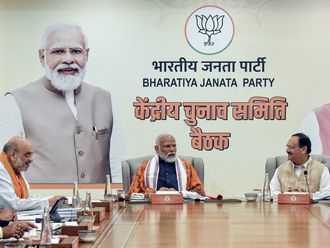Last month, in the poor Bangladeshi village of Kawabadha, a shy little girl named Morsheda turned five years old in a brand new red dress. Morsheda sang and danced with her friends and family and feasted on a traditional dessert made of rice and sugar. But unfortunately, Morsheda's fifth birthday celebration is an event many children around the world will never experience.
Each year, 7.6 million children die before their fifth birthdays from preventable causes and diseases. These conditions are often worsened by the chronic malnutrition and food shortages. That is why last month USAID launched a public campaign called "Every Child Deserves a 5th Birthday" to help raise awareness and end these avoidable child deaths. The topic will enter the global spotlight this month as world leaders take on hunger at the G-8 Summit at Camp David.
For solutions, government and development sector leaders should heed the lessons of a massive-yet-innovative programme that is not only helping children such as Morsheda reach their fifth birthdays but also ensuring they grow healthier, and in many cases, taller.
Called Shouhardo, a Bangla word for "friendship," the programme is run by the poverty-fighting organisation CARE, USAID, and the government of Bangladesh. The first phase, implemented from 2004 to 2010, represented the largest non-emergency USAID food security program in the world. But Shouhardo is about much more than food. It employs an integrated approach that addresses how people support their families and access nutritious meals. And it strikes at the underlying causes of malnutrition, including the deep inequities between women and men.
The results of Shouhardo have been phenomenal: Over the last four years, child stunting, the measure of the shortfall in growth due to malnutrition, has plummeted 28 per cent despite natural disasters and spikes in food prices. The reduction came at twice the rate of the average US government funded project of its kind in Bangladesh.
Addressing disparity
Bangladesh has the one of the world's highest child malnutrition rates, but the country's active and supportive government has helped contribute to the programme's success.
Shouhardo is one of the most comprehensive and integrated food aid programmes in the world. While women's empowerment initiatives aren't new, the idea of combining direct interventions (such as giving pregnant women rations of food) with indirect interventions (such as addressing the disparity between women and men) is one of the programme's signature aspects.
Morsheda is one of more than 2 million people who have benefited from Shouhardo. Morsheda's family calls her a "nutrition baby" because her mother Hanufa received nutritious food while she was pregnant until Morsheda was two years old. One distinctive finding from the Shouhardo programme, documented in a recent paper published by the Institute of Development Studies, was how women's empowerment played a key role in reducing stunting rates compared to just giving food packages alone.
The reasons for this are quite simple. In Bangladesh, the woman of the household is usually the primary caretaker of the child. As the woman becomes more empowered, she is able to negotiate with her husband to determine the types of food to grow and to buy. Over the past few years, we saw women introduce more nutritious diets into their households.
The Shouhardo programme has been extremely effective in empowering women, but the programme still has areas for improvement, particularly around engagement of men and boys. Breaking the traditional conservative attitudes about women was indeed a challenge, but with the combination of interventions in Shouhardo, women began to gain more decision-making power.
For the past 20 years, CARE has worked to promote savings groups in sub-Saharan Africa. As with similar initiatives in Bangladesh, the savings group programs typically bring together women to help them gain confidence and the power to make decisions. In many of these communities, women have become political leaders and successful entrepreneurs.
— Christian Science Monitor
Faheem Khan is the head of the Shouhardo programme and works for CARE Bangladesh.









